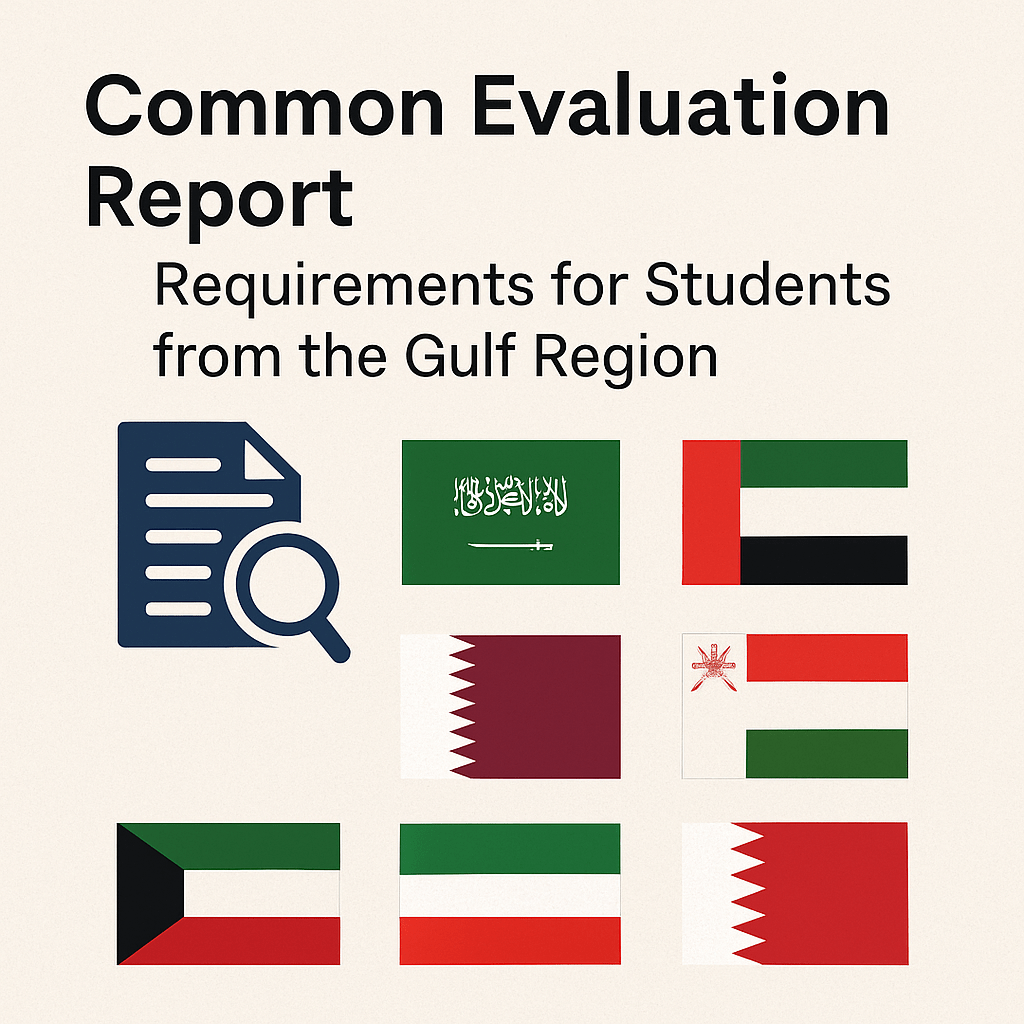
As more students from the Gulf Region (UAE, Saudi Arabia, Qatar, Kuwait, Bahrain, Oman) pursue education abroad, understanding the credential evaluation process has never been more important. Universities worldwide use academic evaluation reports to determine whether foreign credentials meet their admission standards. This guide outlines the most common evaluation requirements across the U.S., U.K., Europe, and Asia for both undergraduate and graduate applicants.
What Is a Credential Evaluation Report?
A credential evaluation report is an analysis of a student’s foreign academic qualifications to determine their equivalency in another country’s education system. It can be required as part of the admissions process and is usually conducted by a recognized evaluation agency or a national authority.
Evaluation reports typically include:
- Verification of authenticity
- Credential equivalency (e.g., Is your diploma equivalent to a U.S. high school diploma?)
- Course-by-course breakdown (for graduate-level or credit transfer evaluation)
- Grading scale comparison
Why Gulf Students Need to Pay Attention
Credentials issued in the Gulf (such as the Thanawiya Amma or Tawjihiyah) are recognized globally, but their format and evaluation vary by country. Students from the Gulf must ensure their documents are properly translated, notarized, and evaluated through accepted channels to avoid delays or rejections.
Country-by-Country Requirements
| Destination Country | Evaluation Required? | Accepted Evaluation Type | Third-Party Agencies Accepted | Notes for Gulf Students |
| United States | Yes, often required | Document-by-document (UG) / Course-by-course (Grad) | WES, ECE, ACEI, others | Needed for nearly all foreign applicants; some universities may evaluate in-house |
| United Kingdom | Sometimes | Depends on institution | UK ENIC (formerly NARIC), in-house | Many universities assess credentials directly; UK ENIC can help with complex cases |
| Germany | Yes | Document-by-document | ZAB, anabin (recognition database) | May require certified copies and translations; public universities strictly verify credentials |
| France | Yes | Document-by-document | ENIC-NARIC France | Translation into French may be required; use Campus France as a hub |
| Netherlands | Yes | Depends on the degree level | Nuffic, university-specific | Bachelor’s admissions often require credential evaluation; graduate schools may use NARIC |
| Italy | Yes | Verification and comparability | CIMEA or “Dichiarazione di Valore” via consulate | Legalization is often needed; an embassy-issued evaluation document is required |
| Japan | Sometimes | Varies by university | In-house review | Japanese universities often ask for certified translations and GPA reports |
| South Korea | Sometimes | Varies | In-house or NIIED | Not always required, but GPA equivalency and transcript validation are needed |
| China | Sometimes | Not standardized | China Credential Verification (CHESICC) | May require additional validation of a high school diploma or a university degree |
| India | Yes (for grad mainly) | Document-by-document | In-house, WES (for some schools) | Universities expect notarized and translated documents; evaluation for equivalency varies |
| Malaysia | Yes | Document-based | EMGS, a university in-house | English is widely accepted; clear notarization and verification are required |
| Singapore | Sometimes | Depends on the program level | In-house | Local institutions usually review documents directly; certified true copies are required. |
Undergraduate vs. Graduate Expectations
- Undergraduate Applicants:
- A high school diploma must be equivalent to secondary completion in the destination country
- Document-by-document evaluations are common
- Graduate Applicants:
- Must hold a bachelor’s degree equivalent to the host country’s undergraduate degree
- Course-by-course evaluations are often required for credit recognition or eligibility.
Tips for Gulf Region Students
- Start early: Credential evaluations can take 2–6 weeks, depending on the agency
- Use certified translations: All non-English documents should be translated and notarized.
- Check legalization needs: Some countries may require apostilles or embassy attestation.
- Select the right evaluator: Utilize agencies recognized by universities in your target country.
- Follow institution-specific guidelines: Always verify whether the school accepts in-house review or mandates third-party evaluation.
Final Thoughts
Credential evaluation is a critical step for Gulf students seeking to study abroad. Each destination country has its own rules, and understanding them early helps ensure a smooth application process. Whether you’re applying to a bachelor’s program in Japan or a master’s in the U.S., preparing the right evaluation report can make all the difference.
Need help with your evaluation? Start your application with ACEI today.
